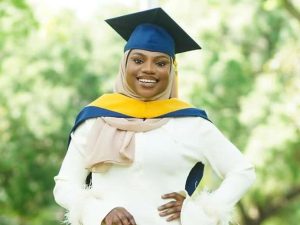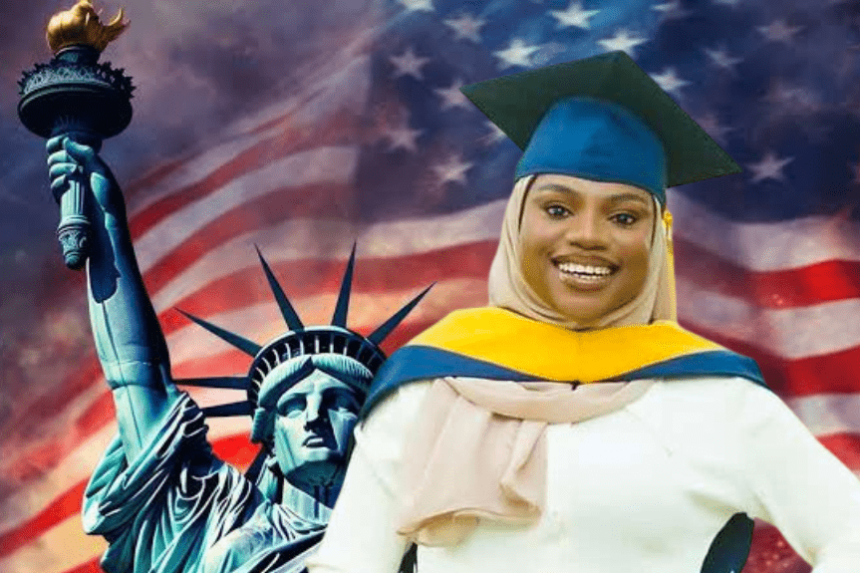The pursuit of knowledge knows no borders, and Nigerian scholars are making significant strides on the global stage. One such individual is Balqees Dadeowo, who has achieved a perfect CGPA of 4.0 in her Master’s program in Applied Physical Science from Georgia Southern University in the United States.
After her highschool education, the story of Balqees Dadeowo continued at Ladoke Akintola University of Technology, Ogbomoso, where she studied Human Anatomy. The YouTuber says the toughest part of the journey for her was “balancing the demanding workload with personal responsibilities, especially during pregnancy and early motherhood.”
Throughout the master’s program, Balaees demonstrated exceptional academic prowess, earning top grades and impressing her professors with her analytical skills. Her achievement is not only a reflection of her individual brilliance but also another living proof to the potential of Nigerian scholars on the global stage.

In this exclusive interview with Techparley, Balqees Dadeowo shares her experiences, lessons learned, and advice for young women pursuing careers in STEM fields.
Congratulations Balqees Dadeowo on your impressive academic achievements, especially for having a perfect CGPA of 4.0 in your master’s program. How did you manage to balance your studies and the need to adapt to a new space like the US?
Thank you so much! Achieving that balance wasn’t easy, but I approached it with determination and careful planning. I made it a priority to understand my coursework requirements early and set a structured routine that allowed me to focus on academics while also settling into a new environment. I made use of resources like academic advisors, campus libraries, and the amazing African and Nigerian community to stay on track.
Outside of academics, I allowed myself time to adapt by exploring the culture, asking questions when I didn’t understand something, and maintaining a strong support system through regular calls with family and friends back home. It was a combination of discipline, curiosity, and staying connected to my roots that kept me grounded and focused.
You conceived and had your baby during your master’s program. How did you navigate the challenges of pregnancy and motherhood while pursuing your academic goals?
This was one of the most challenging yet rewarding phases of my life. I had to be very intentional about how I managed my time. During pregnancy, I hesitated to communicate with my professors because I assumed they wouldn’t care (which I later realized wasn’t true). After my baby was born, I reached out to my graduate coordinator, professors, and peers to explain my situation, and they were incredibly supportive, offering flexible schedules when needed.
I also relied heavily on my family for emotional and physical support, especially during sleepless nights. Sometimes, I studied with my baby in my arms or used short nap times to complete assignments. Balancing both roles taught me resilience and fueled my determination to succeed academically, even during the toughest moments.
How did your previous education and experience in Lautech, Ogbomoso, contribute to your success in the US?
Lautech provided me with a solid academic foundation and the resilience to tackle challenges head-on. The rigorous training, emphasis on self-learning, and focus on personal development during my undergraduate years prepared me for the analytical demands of my master’s program.
Additionally, my time at Lautech instilled perseverance and time management skills, which were critical for juggling responsibilities in the US. The competitive learning environment gave me the confidence to seize opportunities and adapt to a different academic culture.
We are different people with different preferences. For Balqees Dadeowo, what’s her best course during the program, and why? Who do you consider your best lecturer during the program?
My favorite course was Analytical Instrumentation because it offered a perfect blend of theoretical knowledge and practical application. It was fascinating to see how the concepts we learned could be directly applied to real-world problems, especially in pharmaceutical quality control, which is one of my passions.
As for my best lecturer, I can’t single out one because several professors stood out by simplifying complex topics and incorporating real-world examples into their teaching. So, I greatly appreciated lecturers who brought real-world examples into their teaching, making the learning process not only engaging but also applicable in the outside world.
What’s the toughest part of the program, and how did you scale through?
The toughest part was balancing the demanding workload with my personal responsibilities, especially during pregnancy and early motherhood. There were moments when it felt overwhelming to meet deadlines, complete assignments, and stay on top of projects while being present for my family.
At one point, I even considered taking an extra semester to ease the pressure. Ultimately, I scaled through by breaking tasks into smaller, manageable chunks and staying consistent. My husband’s encouragement and support were instrumental, and celebrating small wins along the way helped me stay motivated.
What are some of the most significant lessons you learned during your master’s program?
I learned that adaptability and resilience are key to success. Whether it was adjusting to a new academic system, finding ways to manage my time effectively, or navigating the learning curve of parenthood, being flexible made all the difference.
Collaboration was another significant lesson, working with peers from diverse backgrounds taught me the value of teamwork and different perspectives. Lastly, I realized the importance of self-care and the courage to ask for help when needed.
No one achieves success entirely on their own, and it’s okay to lean on others when necessary.
How do you define success, and what goals have you set for yourself in the short and long term?
To me, success is about achieving a balance between personal fulfillment and positively impacting others. It’s not just about hitting milestones but also about continuous growth and uplifting those around me.
In the short term, my goal is to deepen my expertise in quality control and secure a role that allows me to contribute meaningfully in that field.
Long term, I want to merge my academic background with my entrepreneurial spirit to make a difference in both the pharmaceutical industry and the modest fashion world. Success, for me, is continuous growth and purpose-driven contributions.
What was your biggest challenge when you first settled into the US? Did you at any point miss home?
The biggest challenge was adjusting to cultural differences and building a support network in a completely new environment. I missed the familiarity of home—especially the strong sense of community.
As a Black Muslim hijabi, I also missed seeing people who looked like me, which was a stark contrast to what I was used to. However, I stayed connected to my family and friends back home, which helped me feel less isolated.
Gradually, I built a community here through the mosque, classmates, and other social circles. Embracing the new culture while holding onto my roots helped me strike a balance and feel at home.
You run an impressive fashion YouTube channel. Tell us about it. How do you stay organized and manage your time effectively between your academic pursuits, YouTube channel, and family responsibilities?
Thank you! My YouTube channel focuses on sewing modest outfits, which combines my passion for fashion with a creative outlet. During my master’s program, I had to take a break from YouTube to manage other aspects of my life more effectively.
After graduation, I resumed the channel with a renewed focus. To stay organized, I use tools like calendars and to-do lists, and I batch-create content to maximize productivity. The channel is more than just a hobby, it’s a platform where I connect with others, share my creativity, and inspire people to embrace modest fashion.
How did technology play a role in your success, particularly with your YouTube blog and online presence?
Technology has been an essential part of my success. For my YouTube channel, tools like video editing software and analytics platforms help me create high-quality content and better understand my audience.
Academically, technology enabled me to access resources, conduct research, and collaborate with peers remotely. Technology is at the heart of my creative and academic pursuits, making everything easier, more efficient and accessible.
What’s next for you? Will you continue to pursue academia, focus on your YouTube channel, or explore other passions?
I plan to explore all three! My immediate focus is on contributing to the pharmaceutical industry while growing my YouTube channel as a platform for creativity and empowerment. Additionally, I aim to explore entrepreneurial opportunities that merge my academic expertise with my passion for modest fashion.
Pursuing an MBA in healthcare is also on my goal list. My future is about integrating these passions and making meaningful contributions across different fields.
What advice would you give to young women who are interested in pursuing careers in science, technology, engineering, and mathematics (STEM)?
Believe in yourself and your potential. STEM can be challenging, but it’s incredibly rewarding. Don’t hesitate to ask questions or seek help, learning is a continuous process.
Build a strong support system, network with mentors, and surround yourself with people who encourage you to aim higher. Most importantly, remember that you belong in STEM, and your unique perspective is needed to drive innovation and progress.





